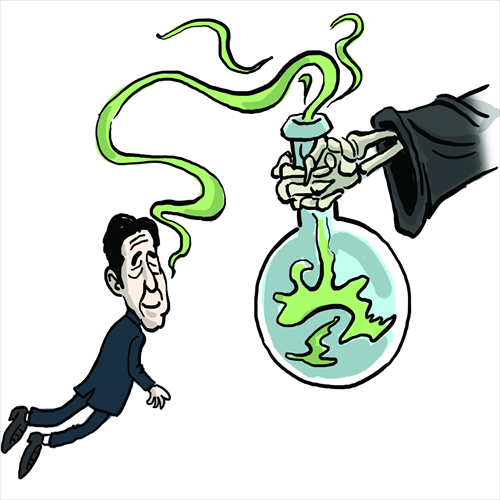Asia must ensure Abe maintains pacifist pledge

Illustration: Liu Rui/GT
Editor's Note:
The Japanese cabinet on July 1 approved the reinterpretation of the country's pacifist constitution, lifting the ban on the right to collective self-defense. The move has deeply unsettled Japan's neighboring countries and also met opposition from the Japanese public. Japan's hawks and its allies insist the move is designed to strengthen regional security, but from the perspective of its neighboring countries, the consequences are much grimmer.
Japanese Prime Minister Shinzo Abe's decision to reinterpret Japan's constitution to allow Tokyo to exercise collective self-defense has set off alarm bells in China and South Korea, as well as sparked opposition protests in Japan itself. This last point, protests at home, speaks volumes for why fears of a "remilitarized" Japan or Abe's efforts to "overturn the country's postwar pacifism," to use Xinhua's words, are overwrought.
The problem is that the revisionist rhetoric from Abe and right-wing nationalists in the Liberal Democratic Party undermines Tokyo's national security agenda and raises legitimate suspicions about its intentions. Thus recently when attending a commemoration of the 77th anniversary of the start of the war with Japan, Chinese President Xi Jinping condemned those "who ignore the iron-clad history."
This is a self-inflicted wound. It also angers many in the US, and Abe needs to underscore Japan's apologies if he is serious in proclaiming "Japan is back." The US has pressured Abe to halt discussion about revisionism, and he has backed off political efforts to recant the Murayama and Kono apologies.
In any case, close inspection of what was actually done reveals a less than radical shift, and one that will need to have legislation enacted in Japan's parliament, the Diet, where Abe's minority coalition partner, the pacifist New Komeito Party, will continue to reign in Abe's ambitions. Recall, Abe took office wanting to rewrite Article 9 of the constitution which renounces war. Political realities forced him to abandon that effort and just reinterpret the constitution, something that has been done often in Japan.
There is understandable concern about Japan's strategic direction. But Tokyo's defense budget at $47 billion this year has only been increased by less than 3 percent. Moreover, there is the post-WWII pacifist culture in Japan that remains an important part of Japan's national identity. It is no accident that the Japanese public is deeply divided, with close to a majority against Abe's collective self-defense.
This political reality limits how far Abe can go in the direction of a stronger military. With defense spending remaining at about 1 percent of GDP, a "remilitarized" Japan is still far away. And most importantly, if Abe's efforts to reform Japan's economy do not succeed, his national security goals will not be realized.
Abe's efforts on national security are aimed at Japan acting more like a normal country. Right now, if North Korea fired a missile at the US or a US ship, despite the alliance, Japan would not be allowed to help. Even Japanese peacekeepers are now not allowed to use force unless they are responding to an attack.
Chinese and Korean concerns are legitimate. At the same time, critics should bear in mind the facts of what Abe's cabinet actually approved.
The decision states that the legal grounds for exercising collective self-defense require three conditions: An armed attack takes place against an ally of Japan and there is a clear danger to the people's right to life; there are no other appropriate measures to ensure the country's existence; and the use of force is kept to the minimum necessary. Moreover, it may be a year or more before legislation is enacted to permit collective self-defense to be exercised.
When North Korea fired a missile over Japan in 1998, Japanese were shocked, much like the impact the Russian launch of Sputnik in 1958 shocked Americans.
What also affects Japanese people's psychology is that in 2000, China's economy was roughly $1 trillion - more than four times smaller than Japan's. Now it is nearly $3 trillion larger than Japan's.
Explaining the cabinet decision, Abe said, "I want to clearly say once again that Japan will never become a country that wages war again." That has been a reality since 1945. Japan deserves the benefit of the doubt. But Asia must hold Abe to that pledge.
The author is a senior fellow of the Brent Scowcroft Center for International Security at the Atlantic Council. He served as a member of the US Department of State Policy Planning Staff from 2004 to 2008, and on the National Intelligence Council from 2008-12. Follow him on Twitter at @RManning4